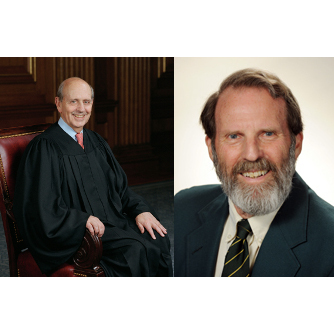The Law Review Volunteers with Ronald McDonald House
On Friday, associates and editors of the Law Review Vol. 83 and 84 volunteered with the Ronald McDonald House of Washington, DC. The Law Review was honored to be given the opportunity to give back to the community in some small way. The Ronald McDonald House Charities provides shelter for families to stay when traveling... Read More
Response: Opacity, Complexity, and Self-Regulation in Investment Banking
Professor Alan D. Morrison & Professor William J. Wilhelm, Jr · April 2015 83 Geo. Wash. L. Rev. Arguendo 1 Response to Andrew F. Tuch, The Self-Regulation of Investment Bankers 83 Geo. Wash. L. Rev. 101 (2014). We discuss the role of professional standards in investment banking in light of Professor Tuch’s wide-ranging and thought-provoking analysis.... Read More
Alumni Newsletter | Volume 83
Dear Law Review Alumni, It is with great pleasure that I write you with the Volume 83 George Washington Law Review Newsletter. Though this newsletter has been on a brief hiatus, we have brought it back in conjunction with the first issue of Volume 83. The goals of the annual newsletter are to help build... Read More
Party Subordinance in Federal Litigation
Professor Scott Dodson 83 GEO. WASH. L. REV. 1 American civil litigation in federal courts operates under a presumption of party dominance. Parties choose the lawsuit structure, factual predicates, and legal arguments, and the court accepts these choices. Further, parties enter ubiquitous ex ante agreements that purport to alter the law governing their dispute, along... Read More
Alabama Legislative Black Caucus v. Alabama
Response by Dean Alan B. Morrison Geo. Wash. L. Rev. Docket (Oct. Term 2014) Alabama Legislative Black Caucus v. Alabama, 575 U.S. ___ (2015). Docket No. 13-895; decided March 25, 2015 Slip Opinion | Washington Post | SCOTUSblog Claims of Racial Gerrymandering Get a Second ChanceAfter the 2010 census, Alabama had to revise the lines... Read More
B&B Hardware v. Hargis Industries
Response by Professor Roger Schechter | Geo. Wash. L. Rev. Docket (Oct. Term 2014) B&B Hardware, Inc. v. Hargis Industries, Inc., 575 U.S. ___ (2015) | Docket No. 13-352; argued decided March 24, 2015 Slip Opinion | NY Times | SCOTUSblog Ever since the adoption of the Lanham Act in 1946,1 the relationship between the... Read More
Severability, Remedies, and Constitutional Adjudication
Professor John Harrison 83 GEO. WASH. L. REV. 56 In several recent cases, the Supreme Court has described the issue of severability as one of remedy. The Court’s reasoning seems to be that once a court has found that one provision or application of a statute is unconstitutional and invalid, it then must decide how... Read More
The Self-Regulation of Investment Bankers
Professor Andrew F. Tuch 83 GEO. WASH. L. REV. 101 As broker-dealers, investment bankers must register with the Financial Industry Regulatory Authority (“FINRA”) and comply with its rules, including the requirement to “observe high standards of commercial honor and just and equitable principles of trade.” As the self-regulatory body for brokerdealers, FINRA functions as the... Read More
LAWS unto Themselves: Controlling the Development and Use of Lethal Autonomous Weapons Systems
Gwendelynn Bills 83 GEO. WASH. L. REV. 176 Lethal Autonomous Weapons Systems (“LAWS”) are robots used to deliver lethal force that possess near-human decision making abilities. Although LAWS do not yet exist, recent military advancements have laid the foundation for the development of autonomous weapons technology. Current weapons, such as the United Kingdom’s Taranis or... Read More
Public Muscle and Private Profit: A Flawed Scheme for Stemming Foreclosures Through the Power of Eminent Domain
Brandon Boxbaum 83 GEO. WASH. L. REV. 209 A new scheme, first introduced by Professor Robert C. Hockett, and later advocated for by Mortgage Resolution Partners, seeks to persuade municipalities and local governments to use its sovereign power of eminent domain to seize residential mortgages. The power of eminent domain is the power to take... Read More


